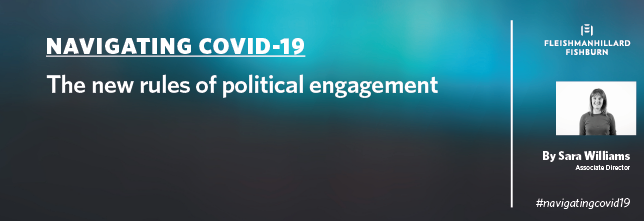The New rules of political engagement

The New rules of political engagement. By Sara Williams, Associate Director
If I had to pick a phrase that best sums up the conversations I’ve been having with clients and colleagues since the crisis began it would be this:
“Actually, this Technology works rather well”
In a period characterised by uncertainty and negativity, it seems we can all agree that one positive constant has been how different digital platforms and tools have helped public affairs practitioners get on with servicing our clients.
And not to be out done, the House of Commons held its first ‘virtual’ sitting of Parliament, allowing MPs to scrutinise the Government while social distancing measures are still in place.
Whilst the technology was not without its teething problems, and the interactions on screen lacked the energy and intensity of the political sandpit which is the House of Commons chamber, most observers concluded that the initiative worked.
Whilst the ‘virtual’ parliament is currently limited to oral questions, statements and urgent questions, we may soon see the technology extended to other debates and utilised to scrutinise legislation. This provides flexibility and opportunity for both parliamentarians and businesses.
Ultimately, the last few weeks have shown us that location is no longer an issue. Parliamentarians are very willing to participate in virtual meetings (whether bi-laterals or roundtables) and dare I say it, we have found it easier to schedule and organise such meetings, rather than scrambling for a coffee and a table at Portcullis House.
For businesses not based in London or the UK, virtual meetings offer ample opportunity. No longer does a meeting take up a whole day but rather a 1-hour slot. But conversely, watch out – location can now no longer be used as excuse for not attending Select Committee sessions or presenting to an APPG.
For MPs, technology could radically change how they interact with constituents and the need for their physical presence in the House.
The usual diary block for MPs travelling from Scotland or Cornwall on a Monday morning can be lifted with the possibility of attending meetings virtually. In addition, the thorny issue of electronic voting might be implemented which would significantly support MPs who are unable to attend for reasons such as illness and parental leave. As a result, we may a see more ‘family friendly’ Parliament with higher voting rates.
For public affairs professionals, technology provides an opportunity to push boundaries and to be more inventive in our campaigns.
Seize this opportunity.
This article forms part of a wider collection of articles on ‘What next for public affairs in a post-COVID world?’ from FleishmanHillard Fishburn’s award-winning public affairs team
Find Out More
-
Platinum CMS Award
March 13, 2024
-
Changing Communications Tack at Mobile World Congress
February 21, 2024


